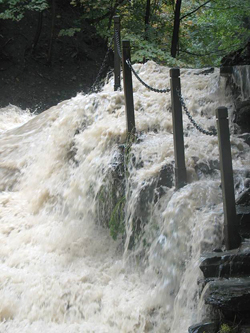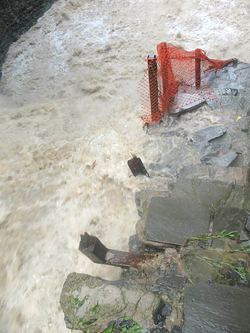FEMA awards $880,000 grant to repair gorge trail
By Susan Kelley


When Mother Nature delivered the one-two punch of Hurricane Irene and Tropical Storm Lee in early fall 2011, Cascadilla Gorge trail got hit hard.
Much of the trail between Stewart and College avenues was submerged under two feet of water moving so fast that it tore off staircase railings and peeled off whole sections of trail paved with mortar and stone. Even the algae in the creek's bedrock didn't survive.
"All the sediment, rocks and debris scrubbed it all off just like sandpaper," said Todd Bittner, director of natural areas at Cornell Plantations.
Now the Federal Emergency Management Agency (FEMA) has awarded Cornell $880,000 to repair the damage and restore the trail to its historic appearance.
"If we didn't have this money, we would not be able to repair the trail the way we want or the way the public expects," said Bittner, who chairs Cornell's Gorge Safety Committee. "This funding allows us to open the trail in a timely way, ensuring public safety and giving the public the access it expects to this iconic landscape."
The office of U.S. Rep. Maurice Hinchey (D-N.Y.) was instrumental in helping Cornell navigate the application process, Bittner added.
"The Cascadilla Gorge trail has been partially closed since Tropical Storm Lee hit in 2011," Hinchey said. "The FEMA funding I worked to secure will help to restore the damaged portions of this trail, allowing visitors to view the natural landscapes just as they appeared in the 1920s and 1930s when the trail was originally constructed during the Civilian Conservation Corps era. It's a great honor to have ensured the continued enjoyment of this magnificent and historic trail."
The repair project will be integrated into Cornell's ongoing trail restoration, which will probably be completed in fall 2013. In the meantime, Bittner reminded the public to abide by "closed trail" signs, not only because of unsafe trail conditions but also because that portion of the Cascadilla Gorge trail is now a construction site. (However, the trail is open between Lynn Street and Stewart Avenue, and upstream of College Avenue.)
In addition to repair and restoration, the project will include work to mitigate damage from future flooding. That will include raising flood-prone sections of the trail by 12 inches to 18 inches, and workers will install new stones and cement that looks like the creek bedrock where the water meets the trail embankment. "That will give us some breathing room before the water eats into the trail again," Bittner said.
The grant is in addition to $2.7 million Cornell has already committed for capital improvements to improve safety for Cascadilla and Fall Creek gorges.
Those investments are part of university's ongoing effort to improve safety in the gorges on and near Cornell, initiated by President David Skorton in August 2011. The Gorge Safety Committee continues to implement plans in four areas: infrastructure, education, alternatives and enforcement.
"These initiatives demonstrate the university's full commitment to the safe and responsible use of the gorges," Bittner said.
Media Contact
Get Cornell news delivered right to your inbox.
Subscribe